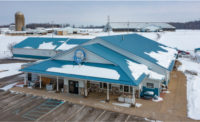According to new research published by New York-based IBISWorld, the United States is home to more than 1,200 dairy processing businesses. With that many players in the industry, it can be difficult for one company to find ways to stand out.
Fortunately, Redwood Hill Farm & Creamery doesn’t have that problem. The Sebastopol, Calif.-based cultured dairy producer is truly unique. It makes products out of both goat’s milk and cow’s milk, and its cow’s milk products are not only organic, but also lactose-free. What’s more, the company’s origins can be traced, believe it or not, to a 4H project.
A bit of history
Redwood Hill Farm & Creamery actually got its start back in the 1960s at Sebastopol’s Redwood Hill Farm, which was owned and operated by Kenneth and Cynthia Bice. The oldest of the 10 Bice children, Jennifer Bice, had developed a love of goats through a 4H project, which led to her helping to raise goats on the farm. That affection for goats eventually led to the construction of a goat-milking parlor and bottling room on the farm site in 1968.
“At the age of 23, Jennifer took over the farm and really started what is Redwood Hill Farm & Creamery today,” said Helen Lentze, senior marketing director for the company.
The operation eventually expanded to include goat milk cheese, as well as the first goat-milk-based kefir and yogurt in the nation, under the eponymous Redwood Hill Farm brand. The artisan goat milk products soon grew in popularity, thanks to their high quality, great taste and easier digestibility and reduced lactose content in comparison to cow’s milk offerings.
In 2004, the company moved processing operations to their current location, a state-of-the-art facility about 4 miles south of the farm. And in 2010, Redwood Hill Farm & Creamery took another gigantic leap when it launched the Green Valley Organics cow’s milk brand (recently renamed Green Valley Creamery).
“Green Valley was launched because goat milk still has lactose in it,” Lentze explained. “So for people who are really lactose-intolerant, they can’t enjoy that dairy, either.”
The company also recognized that it takes more than goat milk dairy to serve a large community, Kathy Housman, national sales director, said.
“Americans are used to cow’s milk. So there are a lot of people that have had to give up cow’s milk because they can’t enjoy it; it makes them feel lousy,” she said. “And there is such a dairy culture here in the U.S.”
In 2015, Jennifer Bice took another gigantic leap when she agreed to sell her growing company to Lucerne, Switzerland-based Emmi. She continued to lead the company until her retirement in December of 2018. Now, her family-owned Redwood Hill Farm continues to supply goat milk to Redwood Farm & Creamery.
A leading goat’s milk brand
The Redwood Hill Farm brand currently includes four flavors of artisan goat milk yogurt, as well as three varieties of kefir. Three varieties of award-winning artisan goat cheese also are available under the brand, although cheese operations are being phased out to make room for cultured product expansion.
“The Redwood Hill Farm products — the plain yogurt and kefir — are actually the number-one and number-two items in the natural foods dairy industry’s yogurt and kefir category,” Housman noted.
Quality goat milk deserves some of the credit for the products’ success.
“Goat milk is a little more difficult to work with, and it has a tang to it that is very specific,” Lentze pointed out. “If it’s of poor quality, it really doesn’t taste good. But our product just tastes incredibly clean — I think that’s what makes us stand out.”
Serving a digestively diverse community
The Green Valley Creamery brand, meanwhile, encompasses five varieties of low-fat and whole-milk yogurt and five varieties of low-fat and whole-milk kefir, as well as cream cheese, sour cream, cottage cheese and butter.
“We really are at the core of this trifecta of being completely lactose-free, real dairy and having a very clean label,” Lentze said of the brand. (According to the National Institutes of Health, approximately 65% of the human population has a reduced ability to digest lactose after infancy.)
And in 2017, the Green Valley Creamery brand became the first dairy brand to be certified as FODMAP Friendly. According to the Australian certifying body, FODMAP Pty Ltd., FODMAPs are a collection of short-chain carbohydrates and sugar alcohols that can be present in food naturally or added to food. They include fructose (when in excess of glucose), fructans, galacto-oligosaccharides, lactose and polyols. FODMAPs are associated with irritable bowel syndrome (IBS) and other digestive issues in certain individuals.
“If you talk to the nutritionist community, they think that [FODMAP-friendly diets] will be the next big thing,” Housman said. “And because the FODMAP diet is kind of a complicated concept, we felt very strongly that we wanted to get the certification.”
The certification process is rigorous. As Housman explained, Redwood Hill Farm & Creamery must send products to Australia, where the certifying body thoroughly analyzes them, examining all of the ingredients.
“You know, no one wants to talk about their IBS,” said Rich Martin, managing director of Redwood Hill Farm & Creamery. “But the reality is that it afflicts millions and millions of Americans, and it is debilitating. … For us, it’s another opportunity to serve a community that just doesn’t have many options.”
As for the brand’s new name, it makes it clear to consumers that the products not only are produced in the Green Valley area, but also are tied to an actual creamery, Martin said. And the new name came with new packaging that emphasizes the products’ clean ingredients and real dairy status.
Before creating the new packaging, Redwood Hill Farm & Creamery conducted a fair amount of qualitative research regarding what would work and what wouldn’t, Lentze said.
“We wanted our product to stand out more on the shelves, which we accomplished while maintaining the look and feel of the brand,” she explained. “We kept our colors, the green and the white, and created a new logo which stands out very nicely.”
The company also wanted to give the brand a more premium look and feel, she added, so it switched to a paper-lined cup. That switch brought with it major sustainability benefits.
“We actually save 40 tons of plastic every year,” Lentze said, “and it’s recyclable — both the plastic and the paper.”
Aligned with a mission
Speaking of sustainability, it’s a big part of Redwood Hill Farm & Creamery’s multi-faceted mission. The creamery runs completely on renewable energy — most of it generated by 2 acres of solar panels on its roof. The balance comes from other renewable sources such as geothermal and wind, the company noted.
Redwood Hill Farm & Creamery is also a certified California Green Business, meaning it is constantly striving to reduce its environmental footprint and integrate sustainability into its core business operations.
Both brands align perfectly with the rest of the company’s mission, too: delivering high-quality natural and organic products to a digestively diverse consumer community — via operations that also place an emphasis on animal welfare.
In fact, Redwood Hill Farm & Creamery was the first goat milk dairy in the United States to be Certified Humane (by Humane Farm Animal Care), Housman noted. Today, all of the farms that provide goat’s milk to the company boast such certification.
The company is every bit as values-driven as it is mission-driven, Martin added. Those values dictate how employees are treated.
“We pay a living wage, not minimum wage, and pay full family benefits,” Lentze pointed out.
Corporate citizenship is important to Redwood Hill Farm & Creamery, too. The company has an ambassador program through which it supports 12 nonprofit organizations — all with values that align with its own — with annual monetary and product donations, she noted. For example, it works with Ceres, a Sebastopol organization that provides free and low-cost meals to primarily low-income people who are struggling because of a serious health challenge.
Not standing still
New products are an ongoing focus for Redwood Hill Farm & Creamery, particularly under the Green Valley Creamery brand. Such new items often result from customer and consumer requests.
That certainly was the case with the newest launch: Green Valley Creamery organic cottage cheese, which hit dairy cases late last summer. Like all other Green Valley Creamery products, the 4% milkfat cottage cheese is lactose-free and FODMAP Friendly-certified.
“It was the number-one most requested new item from our current customers,” Martin noted. “We’re good listeners. And that’s really, I think, the root of our product development process.”
Redwood Hill Farm & Creamery also listened to its consumers after its wildly popular Green Valley Creamery butter was discontinued due to a shortage of organic cream. The company received — and still receives — numerous calls from consumers asking for the butter’s return.
“I’ve been in this industry for a long time, and I’ve never had such a reaction to a discontinuation,” Housman stressed. “It is the most beloved lactose-free product.”
So Redwood Hill Farm & Creamery asked its consumers if they would be accepting of a nonorganic version of the lactose-free product, Lentze said.
“They were like, ‘We don’t care — we just care about the lactose-free part; please bring back my butter!’” she said.
In response, the company plans to relaunch the butter in a nonorganic format sometime this summer. It will be the first of a pipeline of new products planned for introduction over the next few years, Martin said.
As part of its new product development process, Redwood Hill Farm & Creamery also engages its retailer customers — which include most natural food retailers nationally and selected specialty and mainstream food retailers — in the conversation, Martin noted.
“Once we feel like we’ve identified a product that we know the community wants and our retailers are behind the idea, then it’s really just a matter of whether we feel like we can make a really high-quality version of whatever the product is,” he said.
And when the Green Valley Creamery brand enters a new dairy category, that’s actually a boon to retailer customers. After all, the target consumer is the lactose-sensitive or lactose-intolerant person who typically wouldn’t consider the dairy case, Lentze explained.
“So we really provide incremental sales for our retailers,” she said, “and they really appreciate that.”
Aiming to grow
As for marketing, Redwood Hill Farm & Creamery continually strives to spread the word about the goodness of goat milk dairy products. Although the company already has a very loyal consumer following for its Redwood Hill Farm brand, it takes some effort to expand that base, Lentze suggested.
“There’s a perception in people’s minds — and there are some strange myths, too — around goats that we bust all the time,” she said.
On the Green Valley Creamery side, meanwhile, Redwood Hill Farm & Creamery really doesn’t need to convince consumers that they need its lactose-free products. Instead, it needs to build awareness of those products and find ways to bring them to a community that already wants them, Lentze pointed out.
“So we have a really phenomenal problem to solve,” she said.
Key to messaging here is that the products also are suitable for consumers who don’t have issues with lactose. As Martin explained, the products simply taste great.
“You might have one or two people out of a family of five who are lactose-intolerant, while the other three aren’t,” he said. “But as the head-of-the-household shopper, you don’t necessarily want to have to buy two sour creams and two cream cheeses. If you can buy just one, that’s a real win for the house.”
To build awareness for both brands, the company invests in digital advertising and social media campaigns, Lentze said. It also participates in trade shows and events tied to the dietitian community.
A planned push to expand distribution of its products will certainly help Redwood Hill Farm & Creamery in its marketing efforts. Martin said he hopes to grow the brands’ presence in the conventional grocery retail segment, in particular.
The company has been working to increase capacity to support its distribution-expansion plans. It recently moved its yogurt filling and packaging equipment, for example, into a much larger space, he noted, and added a second packaging line to be able to produce more sizes. Redwood Hill Farm & Creamery also installed two new storage silos, built a second incubation room and a second blast chiller, and added a cold storage warehouse and loading dock.
“We have ongoing quality and efficiency projects,” Martin added. “We operate in a very expensive part of the world, so we need to be as efficient as possible.”
Five years down the road, he expects that Redwood Hill Farm & Creamery will have an even more complete line of lactose-free dairy products, too.
“And they will be in everybody’s grocery store,” Martin said.
By that time, more consumers also will be educated about lactose sensitivity and lactose-intolerance, Lentze predicted.
“They will understand the concept better, and I think it will be normal to buy a lactose-free product — maybe even become the expectation,” she said.
Working to its benefit is the fact that Redwood Hill Farm & Creamery doesn’t make “regular” dairy products. So the company boasts a high degree of expertise in goat milk and lactose-free cow’s milk products.
“We’re not like a dairy company that has a lactose-free line extension, which we often see fail because there’s a lack of trust,” Lentze stressed.








